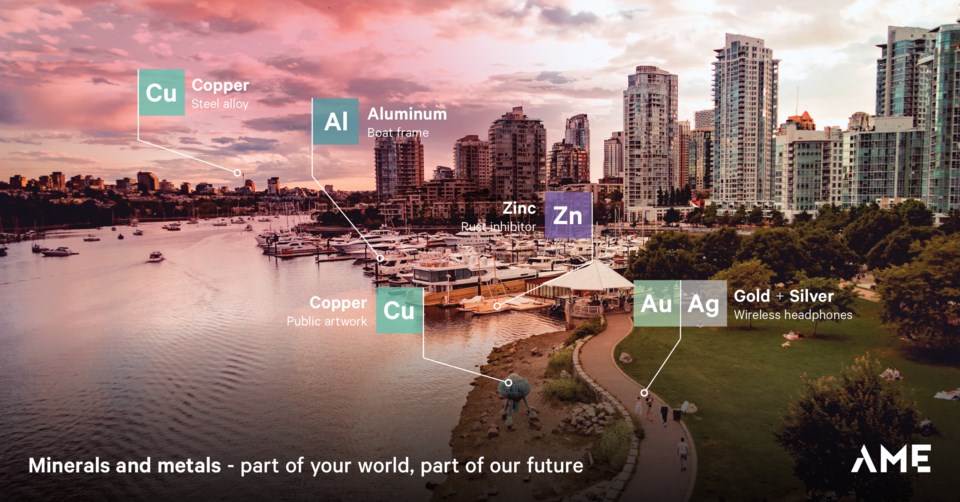At first glance, you might think these symbols are just elements on the periodic table, or answers on a chemistry exam. But they represent so much more than that.
Minerals and metals are applicable and present in our everyday lives, providing us with the technologies and tools that we use on a daily basis.
Minerals and Metals. Photo: Association of Mineral Exploration.
B.C. is rich with minerals and metals to discover and extract, with the most commonly-found metals being copper, silver, and gold — which happen to be vital components in our smart devices, electric bikes and vehicles, and even healthcare technology such as ventilators and anaesthesia machines.
“By exploring for and mining these essential minerals and metals in BC, we ensure that the work being done is responsible, ethical and environmentally friendly as possible,” says Kendra Johnston, President & CEO of the Association for Mineral Exploration, which represents, advocates, protects and promotes the interests of those engaged in responsible mineral exploration and development in B.C. and throughout the world.
Hiking: Minerals and Metals. Photo: Association of Mineral Exploration.
In fact, these minerals and metals that are found, developed, and produced in B.C. are essential to environmental innovation and are the key to a greener future.
When it comes to power generation in B.C., harnessing the energy of the sun and converting the energy of wind to power is a sustainable climate solution. Minerals and metals like copper, silver, molybdenum, and zinc are crucial to the production of solar panels and wind turbines to help us on our path to decarbonization and clean energy.
By 2040, all buses will be battery-electric, and new light-duty vehicles sold in B.C. must be zero-emission vehicles (ZEV), which requires copper, molybdenum, and zinc.
“We are moving away from fossil fuels and gas powered machinery into the direction of electrification, which requires many more minerals and metals for the production of wiring and batteries,” adds Johnston. “An electric car requires four times more copper than a regular gas powered car.”
Finding the core ingredients to building the essential resources that are part of your world and part of our future requires a team effort from B.C.’s mineral explorers — the people at the forefront of the exploration and mining process of B.C. minerals and metals.
As gracious users of the land, mineral explorers are living proof that mineral exploration and the environment are intertwined.
“Most mineral explorers came into the industry because of a love for the environment, and that transitions nicely into a job in mineral exploration, as they spend the vast majority of their time hiking along ridge tops or along creek valleys, looking for signs of mineralization,” says Johnston.
Mineral Explorers: Minerals and Metals. Photo: Association of Mineral Exploration.
“They're treasure hunters that are driven by the hunt for new discoveries. They’re outdoor explorers that value the wilderness that surrounds them.”
The field of mineral exploration provides many career opportunities for those interested in environmental science, wildlife and water management.
While prospectors, geologists, and environmental technologists are among the obvious roles in mineral exploration, beyond that, biologists, archaeologists, hydrologists, community engagement specialists, and project managers are also required on the field sites.
“The next generation is especially interested in the environment and doing the best that we can to move forward in a responsible and sustainable manner,” says Johnston. “Mineral exploration needs people who are really passionate about the environment to help us continue to advance.”
"Without mineral explorers, we don't have the minerals and metals that we need the day to day objects that we rely on,” continues Johnston. “It comes down to being able to live the lifestyle that we've all chosen to live and being able to supply the resources needed for the objects we've come to rely on."
To learn more about minerals, metals, and mining exploration in B.C., visit amebc.ca.



